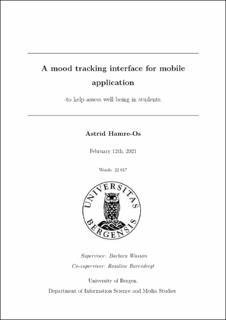| dc.description.abstract | Many students struggle with mental health issues, however, research show that few of them seek help for their problems (Knapstad et al., 2018). In this study, a mobile mood tracking interface is developed with the objective to explore how to best motivate students to track their mood. What the state-of-the-art says about using a mobile application to help students with mental health problems (RQ1) was investigated through a literature review. Research through design (RtD) formed the basis of this research, where a mobile mood tracking interface was developed using an user-centered design process. The interface was evaluated by mental health experts, heuristically by usability experts, and through user testing: design exercise, usability testing, and interviews with students. The design process explored how students perceived the interface (RQ2), and which recommendations designers of a mobile mood tracking interface should consider, in order to best support an intuitive design to motivate students to track their mood (RQ4). In addition, a survey was performed to explore students attitudes towards sharing mental health data (RQ3). The literature review showed that a mobile app that provide self-report could be a good tool to asses well being in students, however, current apps have low engagement within the users. Findings in the prototype, revealed that the way of tracking mood worked fine, however, the students interpreted colors and emojis differently, enjoyed different layouts, and had different notifications preferences. This shows a need for personalization. Students should be able to personalize layout, change notification frequency, and customize colors and emojis on a set of predefined emotion labels. The survey result indicates that students are positive towards sharing mood statistics and notes, however, they are concerned with security and privacy, and thus are less willing to share sensitive data. This thesis contributes to the research field with an analysis of functionality in mental health apps, by producing an artifact, and providing a set of recommendations of what to consider when designing a mood tracking interface for students. Future work can extend these recommendations by performing a longitudinal study investigating motivation, and the interface should be tested with real users, targeting persons with psychological issues. | |
